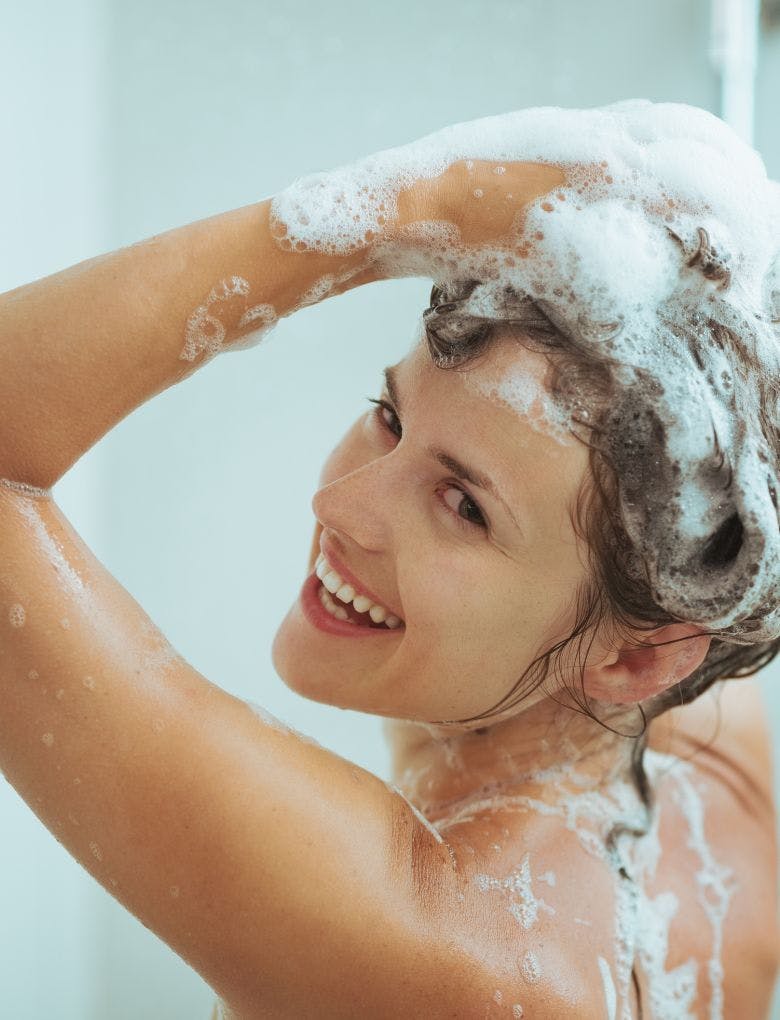Sulfates In Shampoo: Why It’s Not Always A Bad Thing
5 minutes read
There are lots of so-called ‘dirty words’ in beauty, and the presence of sulfates in shampoo undoubtedly sits up top as one of the apparent worst offenders. If a shampoo stocked with sulfates incites a gasp of indignation, you’re certainly not alone, but where did this bad reputation come from? And is it truly deserved?
Sulfates are widespread cleansing agents; most people will experience little to no side effects when using them. They’re just one of many potentially irritating ingredients in haircare. So, writing off sulfate-filled shampoo as poor quality or dangerous isn’t quite the whole story. Let’s get to the root(s) of the issue…
Which sulfates can be found in shampoos?
In a nutshell, sulfates are chemicals often used as cleansing or foaming agents. You’ll find them popping up in the ingredients lists of toothpaste, shampoo, household detergents, plus facial cleansers. What do sulfates do for your hair? They’re responsible for creating that foamy, frothy lather when water is added to the equation.
They work by lowering the surface tension between ingredients, making products easier to mix with water and removing dirt and oil. Therefore, if your shampoo froths, it may contain sulfates. And with good reason, they are really effective. They come from a group of cleansing ingredients called anionic surfactants, known for their ability to deeply slough away unwanted substances, often more effective than other chemical counterparts.
There are two main types of sulphates that you’ll commonly find in shampoo: Sodium Lauryl Sulphate (known as SLS) and Sodium Laureth Sulfate (commonly called SLES). The difference between them is subtle, and both are safe to use, but if Sodium Lauryl Sulphate is left in contact with the skin for too long, it can irritate. SLES is derived from SLS through a process called ethoxylation. This reorganisation of the compound makes it slightly gentler.
Read next: Healthy Hair Tips By The Experts
What do sulfates do to your hair?
In the foaming action created by sulfates, shampoo can move across your scalp more efficiently, meaning every nook and cranny is cleaned, plus you won’t need to use as much product. It also helps any active ingredients within the shampoo work more effectively. Should you be partial to a rather intense hair routine that includes heavy sprays, gels, and oils, then you’re probably aware that these can sometimes be difficult to shift.
One of sulfate’s brilliant properties is its ability to be easily rinsed out with water. Therefore, stubborn products can be removed easily, and future build-up prevented. Sodium Lauryl Sulfate also has antimicrobial properties, which help promote a healthy scalp. When used correctly, sulfates can be a beneficial ingredient for people who struggle with greasy hair or dandruff and are likely to feel the benefits of an excellent sulfate-based shampoo.
Are sulfates harmful to your hair?
You might now be wondering quite where sulfate’s bad press comes from. One potential issue is that they’re simply too good at their job, effectively stripping away dirt and oil from your hair when sometimes it can be beneficial to retain some of your hair’s natural oils. However, ridding your hair of this moisture source can dry out, and your scalp may become irritated. So those with dry, fine, fragile hair or delicate skin may want to tread cautiously.

Some people even believe that sulfates can be harmful to your health. They were once suspected of being a cancer-causing ingredient, but further research has debunked these claims. When used in low concentrations, they are safe for human use. Some theories suggest that sulfate’s bad reputation has more to do with how the scientific studies were interpreted, as opposed to the actual contents of the research itself. These points of contention have been addressed by some beauty product manufacturers (including Clarins), who ensure that the quantities of sulfates they use are very closely monitored – they use a low amount, regulated for personal use.
But this doesn’t mean everyone should be stocking up on sulfate shampoo. As discussed, they can irritate some skin types and damage certain kinds of hair. Plus, some are manufactured using processes that pollute the planet. So, it’s all about arming yourself with the best knowledge possible to keep everything atop your forehead in tip-top condition. Clarins uses certificated no-risk concentrations of sulfates in some of the brand’s products but is always on the search for greener solutions that will minimise their environmental impact. So watch this space.
It’s also worth noting that some sulphated ingredients like Zinc Sulphate and Magnesium Sulphate are often used in beauty products but are not SLS or SLES and do not cause irritation. The way they are made also doesn’t produce pollution, so don’t be alarmed if you see those on an ingredients list.
Read Next: Scalp Health 101
The FAQs
Is sulfate-free shampoo better?
While sulfates have many benefits, particular skin and hair types may need to be avoided. For example, those with skin conditions like eczema or psoriasis may find that after using sulfate shampoo, they experience itching and redness. The American Academy of Dermatology recommends that those with rosacea stick to sulfate-free shampoo if it irritates this delicate skin type.
Likewise, those with naturally frizzy hair may find that sulfate shampoos can be too drying due to how effectively they cleanse your hair of sebum and oil. You can combat these effects by shopping for a shampoo containing smoothing and moisturising ingredients alongside sulfate. Finally, some people who dye their hair find that shampoos containing sulfate can strip colour more quickly than those without. Talk to your hairdresser about what they would recommend post-dye.
Try a hair oil or Nourishing, Strengthening Hair Conditioning Mask to restore shine and care for your colour at home.

The Bottom line:
While those with sensitive skin always need to tread cautiously when stocking their beauty cabinets, no scientific evidence shows sulfates harm your health when used in the correct quantities.
The best move might be to alternate between sulfate and sulfate-free shampoo – to ensure you’re getting a decent cleanse without over-drying.
Read next: How To Look After Sensitive Skin
Sign up for our newsletter
We will keep you in the loop for special offers, exclusive gifts and product news.

